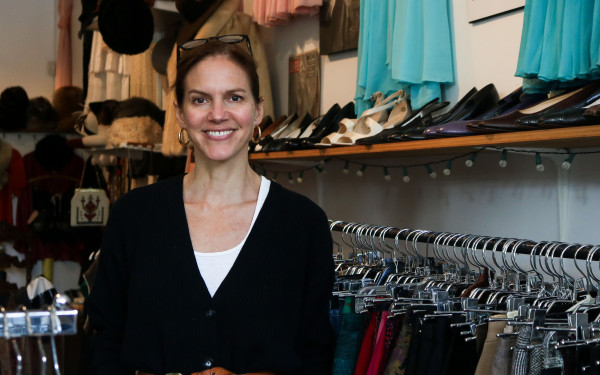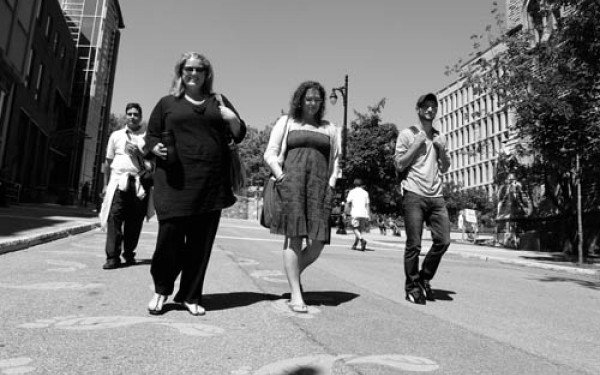The Scary Big Picture
...And a Bucket of Compost
As we were piecing together this special issue, the same dilemma kept coming to mind. By covering individual green heroes, the section might project an overly optimistic image, and that seemed a little negligent, considering how the big picture paints a much gloomier scene.
Every point we wanted to touch on was tied to larger issues that manifest themselves in the giant industrial machine careening ever faster towards the ends of the Earth.
In the developed world, it’s hard to know where the brakes are at all, let alone how to activate them. It’s easy to fall into the trap of thinking there’s no way to escape being part of the problem.
More and more, we hear doomsday scenarios of a not-so-distant future of resource wars and destruction of nature, looming over human advancement like a giant anvil from a childhood cartoon. It’s easy to lose hope of any solution with a problem this big.
Finding a way to stitch sustainability into the fabric of everyday life to the degree that would realistically fix the world seems all too overwhelming. If everyone acted like the fate of the planet depended on their decisions, then we could be saved. But, of course, it’s not that simple. The choice is so hard simply because each one of us has to make it.
Unnecessary Tragedy
In 1968, ecologist Garrett Hardin’s Science article “The Tragedy of the Commons” gets at this dilemma. He writes about how when individuals can take from shared resources unchecked, everyone will take full advantage.
“Because the privatized gain would exceed the person’s share of the common loss,” Hardin pointed out, “a self-seeking individual would seek more exploitation of the commons. And reasoning in the same way, so would all the others. Ultimately, the common property would be ruined.”
And thus the paradox rears its ugly head—it seems we need to save us from ourselves.
But where does this motivation for maximizing personal wealth—at the expense of everything else—come from? Because while the above model seems to offer little hope, whether it’s an accurate portrait of human nature remains to be seen.
Perhaps even more paradoxically, whatever salvation we can hope to achieve seems to be found in other people, in community—in common efforts. It’s a mindset that we might not be using enough, however.
“The picture which is rewarded and predominated is that individuals are isolated, rational decision makers,” says Sheila Mason, ethics professor in Concordia’s Philosophy department. “That’s the utilitarian picture, and it’s the driving force behind capitalism.”
It’s easy to orient yourself towards the lifestyle of material goods and comfort that a personal fortune confers. It’s easy to forget about the environment that makes all this success possible. But without the fragile natural balance that exists on Earth, human existence and progress wouldn’t be possible.
The more of the planet we ruin trying to preserve this way of life we have become so attached to, the more we undermine our ability to live the way we do. This is unsustainability.
It’s not hard to see how we got to this point. In business, material and legal constraints—which are often comparatively toothless—are the only things checking brute exploitation of the natural world. There’s no explicit force inclining corporations to think about the absurdity of infinite growth within a finite space.
“[How we do business] was designed in a period when the pressure on the ecosystem was not as palpable,” said John Molson School of Business Professor Paul Shrivastava. “Now that we know what we are doing, we need to redesign virtually every aspect of our life.”
Some, like Shrivastava, think our economic system needs to shrink a little bit. He’s the director of the JMSB’s David O’Brien Centre for Sustainable Enterprise, an advocate of a multiple bottom-line approach to business practice that teaches businesspeople to maintain a socially and ecologically sustainable model—while maintaining acceptable profit.
Education might be the only way—as it is, ideas of regulation and reform are branded as an attack on personal freedoms by the lobby money behind the business and politics of expansion.
Business as Usual
A champion of the status quo will readily say, “Go ahead; be an environmentalist. That’s your right,” giving a less than cursory glance at the economic and social forces leading you towards consumer culture. But by the time sustainability becomes a financial imperative rather than just an ecological one, causing such a shift will be even harder than it is now.
The fact remains that environmental ethics has not yet worked its way into our lives the way it needs to order to maintain anything close to our way of life for the next generation. We have not yet put enough pressure on those with the power to shift our course.
The question of how to get everyone to save everyone gets even more convoluted when the most powerful push the idea that greed is, for lack of a better word, good for society.
Can the free market save the planet before it’s too late? The bigger question is whether or not we’re really going to take that risk. Businesses need incentives, and perhaps it is also time to re-evaluate what’s important.
“We all do this together. I’m not a Joan of Arc alone, bitterly composting,” said Mason in explaining the fulfilling motivation of acting with the community in mind. “I’m part of a movement.”
What we need is a movement beyond awareness, and practical application of that background dread for the future. Because sustainability is connected to everything we do. It is inevitably the systemic forces that need to change, but that will never happen if we don’t seriously think about our own actions.


_600_832_s.png)



_1_600_375_90_s_c1.jpg)
